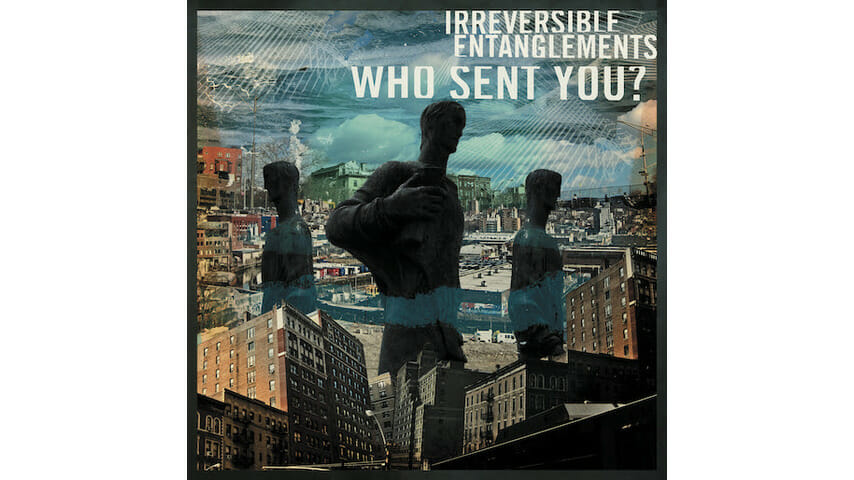Irreversible Entanglements Invoke the Revolution on Who Sent You?
The free jazz quintet’s sophomore album offers radical politics and sonics in equal measure
Music Reviews Irreversible Entanglements
Irreversible Entanglements’ music is as dense as the band’s name: Thick bass grooves underpin errant saxophone swells, as crashing cymbals accentuate the negative spaces between political verses of spoken word poetry. The melodies and time signatures don’t always feel pegged together, but the group inevitably finds their groove in the chaos.
Their music is overwhelming, but Irreversible Entanglements’ excellent second album, Who Sent You?, proves that it’s essential, too. The Philadelphia-via-New York-via-Washington D.C. free jazz quintet met at a Musicians Against Police Brutality concert in 2015 following the murder of Akai Gurley by an NYPD officer. The musicians immediately linked up and booked the studio time that yielded their 2017 self-titled debut, an album marked by its radical leftist politics and swirling free jazz. Camae Ayewa—who also performs as Moor Mother—grounds the group with her poetry, a combination of free-associative desperations and elegant aphorisms: “A mountain ain’t nothing but a tomb for fire,” she forcefully says on album opener “The Code Noir / Anima”.
Ayewa’s poetry is precise, refined and perfectly punctuated by her bandmates. In particular, Tcheser Holmes’ virtuosic drumming finds unnerving counterpoints to her cadence throughout, a volcanic display that’s almost always erupting. Equally incendiary are the saxophone and trumpet lines from Keir Neuringer and Aquiles Navarro, whose shrill melodies deftly flitter between cacophony and euphony, while Luke Stewart’s acoustic bass finds delirious grooves amid the explosions. Though each track is a technical showcase, the album’s melodic best is the thrilling “No Mas,” an uptempo wave with layers of instrumentation bubbling out from underneath one another in a warm mix.
Revolutionary anxieties dominate Who Sent You?, developing imagery of a surveillance state before looking inward to find the path toward liberation. The album is less a document of a rebellion so much as it is a desperate invocation of an impending one: “At what point do we stand up? At what point do we give a shit?” Ayewa repeatedly questions.
The album’s centerpiece, the nearly 15-minute long “Who Sent You – Ritual,” begins as a panic attack. Over-caffeinated saxophones and hammering drums open the cut like a door being battered; Ayewa repeats the album’s title with increasing intensity as a drunken bass line warbles underneath. It becomes clear her narrator is dealing with the police and the panopticism of contemporary life: “Satellites watching / Patrolling / Trigger happy / Stop and frisk / Who sent you? / Here comes the end.” As the disparate and shrill elements crescendo, it’s impossible to keep a lowered heart rate; when the track moves to its more rhythmic second half, it’s an unnerved relief, always on the verge of returning to the sonic and ready violence that preceded it.
Though there are references to specific institutions and policies, Irreversible Entanglements are more interested in condemning positions of power writ large and hoping to inspire a materialist view of history. “Blues Ideology” depicts the Pope, drunken and foaming at the mouth, ignoring his subjects and expanding the Christian empire without care for the many slaughtered in its wake. “Up in the Vatican, getting drunk with the Devil, drunk with power,” Ayewa repeats while the instruments behind her melt into atonal warbling as the song fades out.
When the music returns on album closer “Bread Out of Stone,” it’s rhythmic and quiet, an intoxicating bass loop and delicate percussion conjuring an image of a better future while grappling with the past: “Time and space reunited / The selling and slaving of true time in the valley of fear / Tales of unrest, time reckoning, passed down.” But it’s the lines that open the album that will continue to carry the revolutionary torch: “Stay on it.”